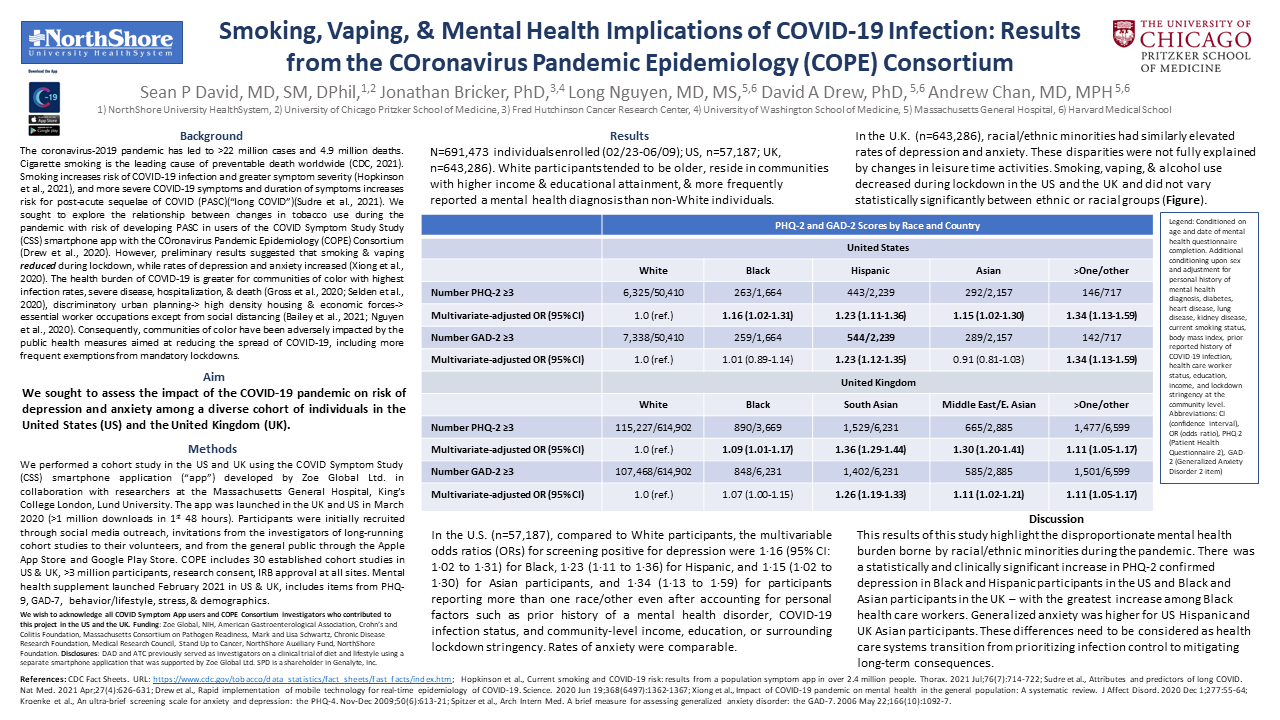PRP078: Smoking and Vaping Frequency and Risk and Severity of COVID-19 Infection: Results from the COPE Consortium
Sean David, MD, MSc, DPhil, FAAFP; Jonathan Bricker, PhD; Long Nguyen; David Drew, PhD; Andrew Chan, MD, MPH
Abstract
Context: The association between current tobacco smoking or vaping and changes in the frequency of both behaviors, and the risk of developing COVID-19 infection and the severity of illness is unclear and the subject of controversy because of conflicting evidence.
Objective: To evaluate the association between tobacco smoking status (current vs. never and former smoking) and longitudinal changes in smoking and vaping on risk of COVID-19 infection, symptom severity, and post-acute sequelae of COVID-19 infection in United States (US) and United Kingdom (UK).
Study Design and Analysis: Prospective cohort study of users of the Zoe COVID-19 Symptom Study app downloaded by individuals in the general population of the US and the UK. Anonymized data was analyzed for individuals who provided informed consent through the app for participation in the COronavirus Pandemic Epidemiology (COPE) Consortium.
Setting or Dataset: Population-based sample of 383,830 app users who provided baseline self-reported medical history, demographic and tobacco history information, daily symptom reports, and who responded to a supplemental mental health survey in early 2021.
Population Studied: Adult app users who downloaded the app after April 1st 2020 and were followed longitudinally through March 31st 2021.
Intervention/Instrument: Adult members of the public were invited to download the app after its launch on radio, TV, via social media, and through existing cohort studies in the US and the UK. At time of app registration, the app records users’ self-reported location, age, height, weight, major risk factors, tobacco use, major medical illnesses, and medication use as well as whether they ever had COVID-19 infection. Continued use records 14 daily symptoms, COVID-19 test results, and prolonged symptoms.
Outcome Measures: New COVID-19 infection, symptom counts, symptom severity, and symptoms >=28 days after initial onset (post-acute sequelae of COVID-19; PASC).
Expected Outcomes: We will report results from multiple logistic regression of history of smoking cessation, smoking and vaping frequency, risk factors, socio-demographics, and association with new COVID-19 infection, symptom counts and severity, and PASC. We hypothesize that pre-pandemic smoking cessation will be associated with lower risk of COVID-19 infection and, if infected, with fewer and less severe symptoms and lower risk of PASC. We also hypothesize that smoking and vaping reduction further attenuates risk.
Objective: To evaluate the association between tobacco smoking status (current vs. never and former smoking) and longitudinal changes in smoking and vaping on risk of COVID-19 infection, symptom severity, and post-acute sequelae of COVID-19 infection in United States (US) and United Kingdom (UK).
Study Design and Analysis: Prospective cohort study of users of the Zoe COVID-19 Symptom Study app downloaded by individuals in the general population of the US and the UK. Anonymized data was analyzed for individuals who provided informed consent through the app for participation in the COronavirus Pandemic Epidemiology (COPE) Consortium.
Setting or Dataset: Population-based sample of 383,830 app users who provided baseline self-reported medical history, demographic and tobacco history information, daily symptom reports, and who responded to a supplemental mental health survey in early 2021.
Population Studied: Adult app users who downloaded the app after April 1st 2020 and were followed longitudinally through March 31st 2021.
Intervention/Instrument: Adult members of the public were invited to download the app after its launch on radio, TV, via social media, and through existing cohort studies in the US and the UK. At time of app registration, the app records users’ self-reported location, age, height, weight, major risk factors, tobacco use, major medical illnesses, and medication use as well as whether they ever had COVID-19 infection. Continued use records 14 daily symptoms, COVID-19 test results, and prolonged symptoms.
Outcome Measures: New COVID-19 infection, symptom counts, symptom severity, and symptoms >=28 days after initial onset (post-acute sequelae of COVID-19; PASC).
Expected Outcomes: We will report results from multiple logistic regression of history of smoking cessation, smoking and vaping frequency, risk factors, socio-demographics, and association with new COVID-19 infection, symptom counts and severity, and PASC. We hypothesize that pre-pandemic smoking cessation will be associated with lower risk of COVID-19 infection and, if infected, with fewer and less severe symptoms and lower risk of PASC. We also hypothesize that smoking and vaping reduction further attenuates risk.

Debra Stulberg
11/20/2021This is such important work. It's impressive how this platform allowed for symptom reporting from a huge sample in such a short time after the start of the pandemic. I hope the disparate mental health impacts of the pandemic will be prioritized in health funding going forward.